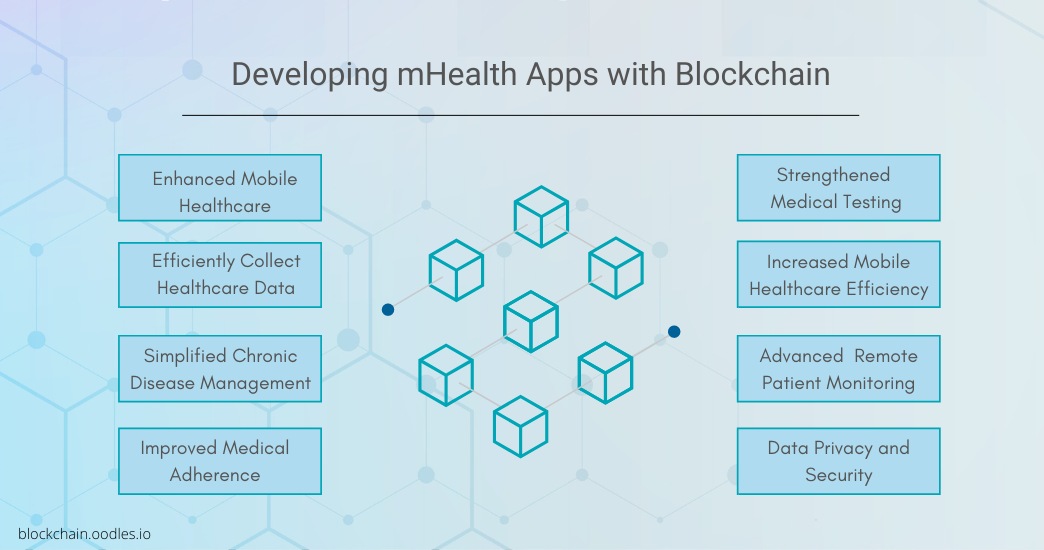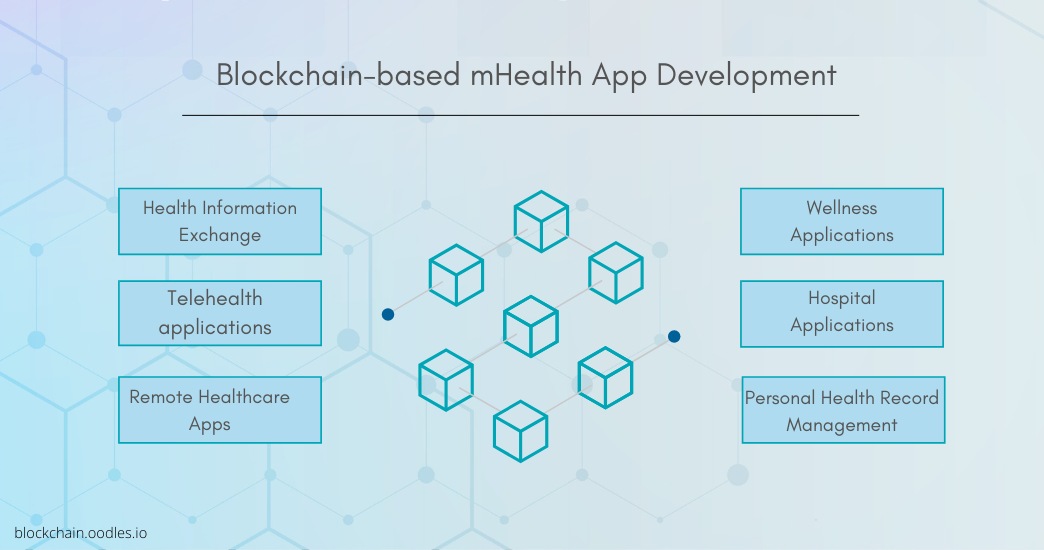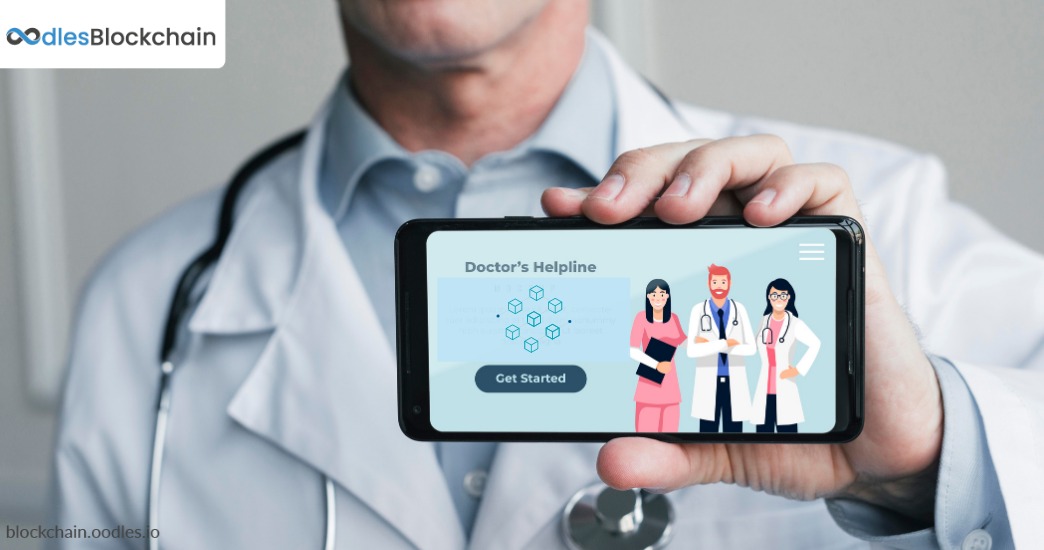-
The healthcare community has recently seen many advancements in healthcare delivery approaches and technology, including mHealth as an evolving field of healthcare apps to increase access to health services. Nevertheless, there are problems involved in the optimal value of mHealth implementation. Thus, in this article, we describe the most critical issues associated with mHealth and how to overcome them with healthcare blockchain development solutions.
What is mHealth
mHealth is basically a part of eHealth. Indeed, to date, no standardized definition has been developed for mHealth. For the survey, mHealth or mobile health was identified by the Global Observatory for eHealth (GOP) as a practice of medical and public health assisted by mobile devices, such as mobile phones, patient tracking devices, personal digital assistants (PDAs), and other wireless devices.
MHealth includes the use and capitalization of the central voice and short messaging service (SMS) utility of a cell phone, as well as more complicated features and applications, including general packet radio service (GPRS), mobile telecommunications third and fourth generation (3G and 4G systems), a global positioning system (GPS), and Bluetooth technology.
In implementing mHealth, we identified five key areas of technological challenges: usability, system integration, data protection, and reliability. We have explained some of the essential principles associated with these difficulties.
Blockchain in eHealth
Blockchain technology has the potential to change health care, place the patient at the heart of the healthcare ecosystem, and improve health data protection, privacy, and interoperability. By making electronic medical records more accurate, disintermediated, and safe, this technology may provide a fresh model for health information exchanges (HIE). This modern, rapidly developing field offers fertile ground for innovation, investment, and proof-of-concept testing, even though it is not a panacea.
A blockchain-driven exchange of health data may unlock the true value of interoperability. Blockchain-based systems can minimize or remove existing intermediaries' friction and costs. Blockchain pledge has widespread consequences for stakeholders in the ecosystem of health care. The opportunity to build on this technology is to connect fragmented processes to generate insights and to better determine the value of treatment. A national blockchain network for electronic medical records will increase efficiencies in the long run and encourage improved patient health outcomes.
Also, Read | Blockchain in Healthcare Data Management | Impact, Benefits, and Use Cases
Blockchain in mHealth
In mHealth systems, this blog critically collects, analyzes, and analyses the blockchain to strengthen processes and services. The findings indicate that the most funded fields that use blockchain are digital health records and personal medical records. Permissions, integration, provenance, and data integrity are the problems to be improved in this area by blockchain technology.
What is Blockchain
A distributed framework for tracking and storing transaction records is Blockchain. Blockchain is a shared, permanent record of peer-to-peer transactions that are constructed from linked blocks of transactions and stored in a digital ledger. To allow each participant in a network to communicate, Blockchain relies on proven cryptographic techniques without pre-existing trust between the parties. There is no central authority in a blockchain system; transaction records are instead stored and distributed among all network members. All participants are aware of interactions with the blockchain and require network verification before the information is added, allowing trustless communication between network participants while recording an immutable audit trail of all interactions.
Also, Read | Improving the Healthcare Infrastructure for Outbreaks like COVID-19 with Blockchain
mHealth Apps Development with Blockchain | Key Benefits

Improving Remote Prescription Adherence
With an automatic prescription, educational details, and refill notifications, Blockchain, and smart contract-powered mHealth apps alert patients to take medications on time. Not only does it ensure adherence to medication while minimizing hospital readmissions and poor performance, but it also helps care providers to facilitate the process to build morale and involvement.
Improving Contact with Providers
MHealth technology based on Blockchain increases the ability to unify the health system and allows doctors, patients, and hospital staff to connect using encrypted texting and messaging, video calls, and access to mobile health records. It guarantees seamless system interoperability, thus reducing the costs and delays associated with fragmented collaboration.
Activating Remote Monitoring of Patients
Doctors can control the condition of patients remotely with blockchain-enabled mHealth apps from the immutable data collected by IoT-enabled wearable devices, such as fitness trackers, wristbands, and watches. Patients can be assured that due to blockchain-powered attributes, there will be no privacy breaches or data misuse.
Improving Diagnostic Quality
By giving them access to patient medical records with minimal errors, Blockchain mHealth apps will reduce the burden on physicians. Doctors can diagnose them easily with access to patient records and handle more patients in a day. Also, patients will determine which data they want to share with which diagnostic provider.
Also, Read | Improving Healthcare Experience with Blockchains like Ethereum and Smart Contracts
mHealth Development with Blockchain | Applications

Secure Health Exchange Applications
mHealth application development with blockchain technology allows the sharing of data and medical images for safe health information to help clinical decisions. Additionally, stakeholders can share health records between patients and care providers seamlessly, safely, and efficiently using the exchange of health information powered by smart contracts.
Advanced Telehealth Apps
Developing blockchain telehealth apps for patients and doctors facilitates them to communicate remotely and virtually without worrying about security. Further, the solutions allow physicians to have a balanced workflow as patients can be handled from anywhere and at any time.
Applications for Wellbeing
The creation of mHealth apps with blockchain produces a robust mobile fitness app that helps fitness enthusiasts schedule a workout, maintain a diet plan, follow their footsteps, and from time to time get exercise tips. Also, providers can monitor their adherence to the variables to reward them and ensure long-term loyalty in return.
Chronic Disease Tracking Apps
App development for monitoring diseases with blockchain healthcare tools ensures tracking with security. Thereby, monitoring and evaluating medical data about patients with chronic conditions and post-treatment rehabilitation processes become trackable and interoperable with other healthcare systems.
mHospital Applications
Building mHospital blockchain applications make it easier for health organizations to improve various processes. It includes appointment scheduling, patient monitoring, inventory management, and other hospital-related tasks. Subsequently, it helps to experience a streamlined healthcare experience for both care providers and patients.
Also, Read | Blockchain for Clinical Trial Management | Ensuring Efficiency
Compliance Requirements for mHealth App Development
- FDA
- GDPR
- SaMD
- HL7
- HITECH
- HIPAA
Additional Technology Integration
Artificial Intelligence and Machine Learning
We work with various technologies for mHealth that include machine learning and skills in artificial intelligence.
IoT Integration
We also create connected mobile health applications that work in tandem with smartphones, smart IoT sensors, and blockchain.
What's Next
As per a CB Insights report, healthcare blockchain could solve some of the biggest healthcare problems. It includes enforcement, interoperability, and data protection problems. Indeed, instead of how you want to start, the more important is just starting. For every boardroom in almost every industry, blockchain is becoming a subject of discussion. Those who wait could find themselves falling behind the remainder of their sector quickly. Connect with our development experts for more information.

Our Offices
INDIA
Emaar Digital Greens, Sector 61,
Gurugram, Haryana
122011.
Welldone Tech Park,
Sector 48, Sohna road,
Gurugram, Haryana
122018.














